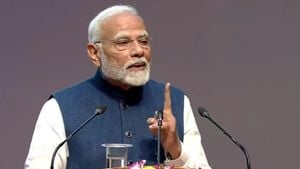Recent public sentiment surrounding U.S. military aid to Ukraine reveals significant shifts and divisions among Americans, indicating deep-rooted partisan divides. According to surveys conducted by leading research institutions like CBS/YouGov and Pew Research Center, the nation stands almost evenly split on the question of whether to continue supporting Ukraine amid its enduring conflict with Russia.
A CBS/YouGov poll published recently showed 51% of respondents oppose military assistance to Ukraine, compared to 49% who support it. This slim majority opposing military aid highlights the continuing split within American society on this issue. The poll date coincided with heightened scrutiny of how Donald Trump's anticipated presidency might influence future aid, raising concerns about potential withdrawal of support from the United States.
Initially, there was strong bipartisan support for Ukraine following Russia's full-scale invasion in early 2022. Many Americans rallied behind the notion of aiding Ukraine as it fought to defend its sovereignty. Yet, as the conflict stretched on, some Republican figures, including members of Congress, began to express reluctance about continuous financial support. The Republican-led House of Representatives even stalled approval of a substantial $61 billion aid package, complicate Ukraine's battle efforts and signaling just how pivotal U.S. support can be.
Among the public, opinions about U.S. responsibility to assist Ukraine diverge sharply along party lines. The latest Pew Research survey showed only 36% of Republicans, as opposed to 65% of Democrats, believe the U.S. has a responsibility to aid Ukraine’s defense against Russian aggression. This marks growing discrepancies between how different factions view the conflict, particularly how it impacts broader U.S. national interests.
Interestingly, the CBS survey revealed varied priorities among respondents when asked about how much importance Trump should place on potentially curbing aid to Ukraine. Of those surveyed, 33% viewed this as a high priority for Trump, 36% considered it medium, and 31% said it wasn’t important at all. This mixed response reflects how Americans grapple with the moral and strategic angles of the war.
Additional data from Pew Research indicated 27% of Americans now believe the U.S. is offering too much assistance to Ukraine. Likewise, only about 18% of individuals felt the U.S. was not doing enough, showcasing the nuanced perceptions among Americans about the scale of support. Democrats remain significantly more inclined to support aid than Republicans. While only 19% of Republicans believed the current level of aid is too low, among Democrats, the number of those feeling aid is insufficient climbed to 28%. This discrepancy points to how partisan loyalties may color perceptions of foreign aid and military involvement.
The partisan gap has grown even narrower as the conflict has persisted. Recent surveys show just 19% of Republicans view Russia’s invasion as posing major threats to U.S. interests, whereas 42% of Democrats hold this belief. Such numbers are telling, as they reveal how political affiliations shape interpretations of foreign policy issues, particularly concerning national security and military commitments.
Through all these surveys, there lies another layer of complexity: the continuing historical support for Ukraine amid one of Europe's most significant conflicts since World War II. With Ukraine's calls for help likely to persist as winter looms and combat continues, the question remains whether U.S. support will evolve or remain stalled amid shifting political landscapes, particularly following the recent election of Trump, who has openly called for re-evaluated foreign aid policies.
These numbers present not only reflective insight on American public opinion but also on the broader narrative of the U.S. as it navigates the treacherous waters of international diplomacy. Support for Ukraine remains both a moral and strategic issue, and with growing skepticism from various segments of the population, it will be interesting to observe how these dynamics play out amid future political developments.
The road forward for U.S. assistance to Ukraine appears fraught with uncertainties. It raises questions about the role of America on the international stage and reveals how sharply divided the national consciousness can be. Whether Americans will see this support as necessary for national security or excessive foreign entanglement remains to be seen, but the conversation is undoubtedly at the forefront of political discourse today.



